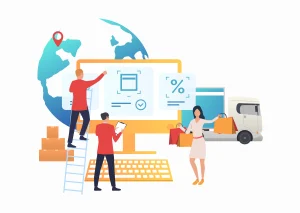TRAINING LOGISTIC MANAGEMENT
TRAINING LOGISTIC MANAGEMENT
DESKRIPSI
Manajemen logistik yang efektif sangat berperan dalam menjamin ketersediaan barang, pengendalian biaya, dan kelancaran rantai pasokan di berbagai sektor industri. Ketidakefisienan dalam proses logistik dapat menyebabkan keterlambatan pengiriman, meningkatnya biaya operasional, serta ketidakpuasan pelanggan. Training Logistic Management ini dirancang untuk membekali peserta dengan pemahaman mendalam mengenai perencanaan, pelaksanaan, pengawasan, dan evaluasi aktivitas logistik secara terpadu agar mampu meningkatkan efisiensi, keandalan, dan daya saing perusahaan di pasar yang kompetitif.
Pelatihan manajemen logistik strategis ini membahas mengenai optimalisasi rantai pasok (supply chain) dan tidak tuntas jika dipelajari dalam hitungan jam. Oleh karena itu, diperlukan waktu tersendiri dan bimbingan yang profesional.
MATERI
-
Introduction to Logistics management
- * Logistical Management
- + What is “logistical management�, or “logistics�?
- + Trends in logistics costs and performance
- + Objectives of logistical management
- + A typical supply chain
- + Supply chain examples
- + Processes involved in supply chains
- + Drivers of supply chain performance
- * Why Study the Supply Chain?
- * Key Issues in Logistical and Supply Chain Management (SCM)
- + Complex supply chain environments
- + Logistic and supply chain planning and decisions
- + Customer service strategy
- + Product life cycle strategy
- + Typical logistics tradeoffs
- * International Issues in the Supply Chain
- + Forces driving toward globalization
- + Regional differences and issues
- * Logistical Management
-
Logistics Network Design
- * The Role of Major Network Design Decisions in a Supply Chain
- + Major network design decisions
- + Objective network design
- + Data for network design
- * Network Design Problems
- * Best distribution strategy
- * The Role of Major Network Design Decisions in a Supply Chain
-
Inventory Management
- * The Inventory
- + Where do we hold inventory?
- + Types of inventory
- + Why do we hold inventory?
- + Why inventory management?
- + Inventory policy
- * Inventory Models
- + Economic lot size / Economic Order Quantity (EOQ) model
- + Optimal amount with discount on purchase price
- + EOQ model with backlogging
- + Effect of nonzero lead-time
- + Variations on the EOQ model — (r,W) Models
- + Effect of demand uncertainties (with a probabilistic demand distribution)
- + Model with uniform lead-time demand and constant lead-time
- + Model with normal lead-time demand and constant lead-time
- + Model with both uncertain lead-time demand and uncertain lead-time
- + Calculation of average inventory under (r,W) policy
- * Expected annual cost of Safety Stock
- * The Inventory
-
Transportation Logistics Management
- * The Transportation
- + Modes of Transportation and their Performance Trends
- + Air, Ocean Ship, Truck, Rail
- + Intermodal (Truck/rail)
- + Other Modes – pipelines, barges ….
- * Transportation Cost Concepts
- + Different groups experience different transportation costs
- + Fixed and variable costs
- + Cost-output curve
- + More definitions of different types of costs
- + Factors affecting transportation decisions
- + Factors affecting carrier decisions
- + Factors affecting shipper decisions
- * Time Value of Money: Future Costs and Present Value
- + Centrality of Capital to Decision Making
- + Opportunity cost
- + Nominal and effective interest rates
- + Compounding for Future Value
- + Discounting for Present Value
- + Annuity Equivalents
- + Uniform series present worth factor
- + Capital Recovery Factor
- + Evaluation – a Few Alternative Techniques
- * Transportation Cost Modeling
- + Engineering unit cost models
- + Intermodal Cost-Output models
- * Tradeoffs: Transportation versus Inventory Costs
- + Total Logistics Cost (TLC) model for intermodal service
- + Choice of transportation mode
- + What will make intermodal service more appealing?
- * Future Changes in Transportation
- + Larger vehicle sizes
- + Capacity constraints
- + Urban congestion
- + Terminal facility and right-of-way congestion
- + The relationship between speed and fleet size
- + Increasing use of intermodal (truck/rail) services
- + Driving down the cost of intermodal services
- * The Transportation
-
Reengineering the Supply Chain Using IT and ITS
- * Definitions
- + Information Technology (IT) and software
- + Intelligent Transportation Systems (ITS) and hardware
- * Proving the impacts of fast changing technologies
- + Simulation – studying the Bullwhip Effect
- + Complexity of doing cost versus benefit analysis
- + Specialized skills favor larger firms
- + Solutions for the smaller firms
- * Key IT functions — Case studies
- + Paperwork and documentation
- + Tracking and ordering
- + Enabler of Third-party Logistics (3PL)
- * From Software (IT) to Hardware (ITS)
- + Benefits of RFID
- + Distribution routing and scheduling
- + Bringing the benefits of ITS to the Littlest Guy
- * Highly complex IT and ITS envirents
- * Definitions
-
Distribution Strategy
- This segment describes the diversified distribution strategy to be applied for effective and efficient distribution operations such as:
- * Shipping Strategies
- * Routing and Scheduling in Transportation
- This segment describes the diversified distribution strategy to be applied for effective and efficient distribution operations such as:

SIAPA YANG DAPAT MENGIKUTI TRAINING INI?
- Staf Logistik
- Supervisor Pengiriman
- Manajer Gudang
- Koordinator Distribusi
- Analis Operasional
TRAINER PADA TRAINING INI
Instruktur yang berpengalaman dalam bidang efisiensi sistem logistik akan mengisi training strategi efisiensi biaya logistik perusahaan.
JADWAL PELATIHAN 2025
- BATCH 1 : 13-14 Januari 2025
- BATCH 2 : 10-11 Februari 2025
- BATCH 3 : 10-11 Maret 2025
- BATCH 4 : 14-15 April 2025
- BATCH 5 : 15-16 Mei 2025
- BATCH 6 : 12-13 Juni 2025
- BATCH 7 : 10-11 Juli 2025
- BATCH 8 : 18-19 Agustus 2025
- BATCH 9 : 17-18 September 2025
- BATCH 10 : 16-17 Oktober 2025
- BATCH 11 : 13-14 November 2025
- BATCH 12 : 15-16 Desember 2025
Calon peserta dapat menyesuaikan jadwal tersebut sesuai dengan kebutuhan
Upgrade diri Anda dengan mengikuti pelatihan bersama kami, berkembang bersama NISBI Indonesia!
LOKASI
Training pengelolaan logistik terbaru ini sudah pernah diadakan di Jakarta dan Yogyakarta. Kami juga bisa menyelenggarakan di kota lain, antara lain :
- Bandung
- Bali
- Lombok
- Makassar
INVESTASI
Investasi pelatihan tersebut menyesuaikan dengan jumlah peserta (on call). *Please feel free to contact us.
Apabila perusahaan membutuhkan paket in house training, anggaran investasi pelatihan dapat menyesuaikan dengan anggaran perusahaan.
BENEFIT
- Module / Handout
- FREE Flashdisk
- FREE Bag or bagpack (Tas Training)
- Training Kit (Dokumentasi photo, Blocknote, ATK, etc)
- 2x Coffee Break & 1 Lunch
- FREE Souvenir Exclusive






